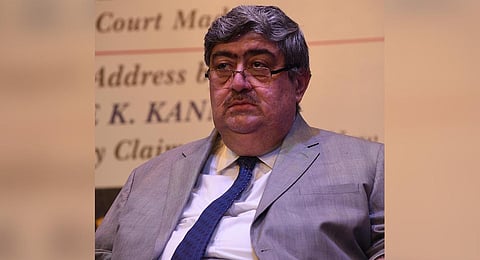

NEW DELHI: An avid lover of theatre, golf and music, Supreme Court judge Justice Sanjay Kishan Kaul will go down Indian judicial history as a judge who took a tough stand on the delay in clearing recommendations made by the collegium and passed citizen-centric orders.
During his tenure of over six years and 10 months as a judge of the apex court, Justice Kaul was part of several landmark judgements including those that held the right to privacy a fundamental right and upheld the Centre's decision to abrogate Article 370 of the Constitution that bestowed special status on the erstwhile state of Jammu and Kashmir.
Justice Kaul, who is set to retire on December 25 this year, had his last working day in the top court on Friday. The apex court will be on winter break from December 18 and re-open on January 2.
He was also part of a five-judge constitution bench that refused to accord legal recognition to same-sex marriage, saying there was "no unqualified right" to marriage with the exception of those that are recognised by law.
"His lordship (Justice Kaul) is deeply interested in theatre, music and golf," reads his profile available on the apex court website.
He also passed several orders in a matter related to crippling air pollution that has been choking Delhi-National Capital Region during winter year after year.
A Justice Kaul-led bench came down hard on the Centre over the delay in clearing the names recommended by the collegium for appointment and transfer of judges and expressed concern over the government's tendency to "pick and choose."
In a major step towards gender equality, a bench headed by Justice Kaul had allowed eligible women to take the examination for admission to the National Defence Academy (NDA).
Justice Kaul took up the issue of non-grant of bail or remission to undertrials or convicts in protracted criminal cases with missionary zeal and passed a slew of directions to decongest prisons and grant of relief to such litigants.
One such significant order was passed by a bench headed by him which said the Allahabad High Court can consider granting bail to convicts who are not repeat offenders and have served 14 years or more as this will ensure a massive decline in the pendency of cases.
A bench headed by Justice Kaul had ordered that anti-CAA protesters agitating in Shaheen Bagh in the national capital cannot block the public road and create inconvenience for others.
People are entitled to protest but it has to be done in an area identified for agitations and not on a public road or park, it had said.
In his verdict on Article 370, Justice Kaul recommended setting up of an "impartial truth and reconciliation commission" to probe and report on human rights violations by both state and non-state actors in Jammu and Kashmir since the 1980s, saying the "wounds need healing."
A five-judge constitution bench headed by Justice Kaul had dismissed the Centre's curative plea seeking an additional Rs 7,844 crore from the Union Carbide Corporation's successor firms to extend higher compensation to the victims of the 1984 Bhopal gas tragedy that left over 3,000 people dead and caused environmental damage.
He also headed a five-judge constitution bench which held the apex court has the discretion of exercising the plenary power it commands under Article 142 of the Constitution to dissolve a marriage on the ground of "irretrievable breakdown" and the authority to dispense with the 6-month waiting period mandated under the Hindu Marriage Act, 1955 while granting divorce with mutual consent.
A five-judge constitution bench headed by Justice Kaul had affirmed the Bar Council of India's power to hold the All India Bar Examination (AIBE), a test that a lawyer has to qualify to practise law in the courts of the country.
Born on December 26, 1958, he obtained his LL.B degree from the Campus Law Centre, Delhi University, in 1982 and enrolled as an advocate with the Bar Council of Delhi on July 15 that year.
He was designated as a senior advocate in December 1999.
Justice Kaul was elevated as an additional judge of the Delhi High Court on May 3, 2001, and was appointed as a permanent judge on May 2, 2003.
He was elevated as the chief justice of the Punjab and Haryana High Court with effect from June 1, 2013, and assumed charge as the chief justice of the Madras High Court on July 26, 2014.
Justice Kaul was appointed as a judge of the Supreme Court on February 17, 2017.